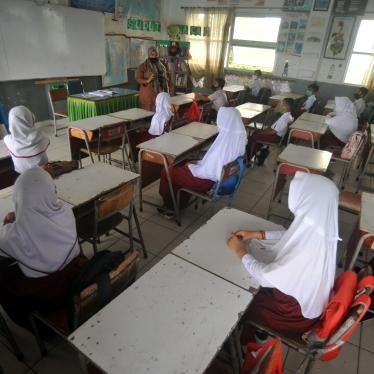Asma - not her real name - left her village at age 13 to journey to Indonesia's capital, Jakarta. She had just graduated from elementary school, but was being pressured to marry a 23-year-old man. To avoid this, she allowed her cousin to arrange a job for her in the city as a domestic worker.
She soon regretted leaving her family. She worked between 13 and 15 hours a day, cooking, cleaning, ironing, and caring for her employers' two children, aged five and eight. She would often get up at 6am and sometimes not get to bed until 1am. She told me that her employer abused her almost daily: "She often hit me. Sometimes she'd pinch me. Sometimes she'd push me against the wall. Slap me. They often called me names - 'stupid, devil, dumb.'"
Asma had been promised 250,000 rupiah a month, equivalent to $25, but in three-and-a-half years with her employer, was never paid. "I asked for my salary, but they never gave it to me," she told me. "They would say 'later.' No reason was given. I would ask three to five times each month. Each time they said the same answer." Her village had no phones, so she could not contact her family for help. Since she had no money, she was unable to go home. She finally escaped by finding another employer.
Asma is one of an estimated 100 million women and girls employed as domestic workers around the world. They are often overworked and underpaid, and in many countries, as in Indonesia, excluded from national labour laws. Without a legal right to a minimum wage, rest days, overtime pay, and other basic protections, domestic workers are at the mercy of their employer and at risk of exploitation and abuse.
Negotiations are currently underway in Geneva as members of the International Labour Organisation - governments, trade unions, and employer federations from around the world - draft a new international labour convention for domestic workers. This convention will be put to a vote on June 16. If adopted, it will for the first time establish global labour standards for some of the world's most vulnerable workers.
Over the last decade, Human Rights Watch has interviewed hundreds of domestic workers in over 20 countries. Many women and girls told us of being expected to work around the clock, seven days a week for months or even years on end. Many were paid far below the prevailing minimum wage, while others, like Asma, were never paid at all, or their wages were withheld. Employment agencies sometimes charge excessive recruitment fees, forcing domestic workers to turn over the first several months of their salary to cover their debt.
Isolated in private homes, domestic workers are at heightened risk of psychological, physical, and sexual abuse. Women and girls told us that their employers had beaten them with belts, sticks, and electrical cords, knocked their heads against walls, and burned their skin with irons, chemicals, and boiling water. They described being propositioned, groped, and raped by men in the household. Many were afraid of reporting sexual violence because of the risk of being fired from their jobs and turned out onto the street.
A growing number of governments are taking measures to address the shameful exploitation and abuse that domestic workers endure. Jordan amended its labour law to guarantee domestic workers a weekly day of rest, paid annual and sick leave, and a 10-hour work day. Last year both Zambia and Switzerland established a compulsory minimum wage for domestic workers. But many others lag behind. Of countries surveyed by the ILO in 2008, half did not impose a limit on the number of working hours for domestic workers, and 40 percent did not guarantee a weekly day off.
Some members of the ILO contend that an international convention for domestic workers is not necessary. But research shows that conditions for domestic workers do not improve without action to improve the legislative framework. An ILO convention guaranteeing domestic workers rights to a minimum wage, limited hours of work, rest days, clear terms of employment, and other protections will establish clear global standards that prohibit exploitation and abuse, and require countries that ratify the new treaty to ensure that their laws are in compliance.
Asma eventually found better employment, but millions of domestic workers continue to endure unacceptable conditions, sometimes akin to slavery. Members of the ILO can and should respond. A convention for domestic workers is long overdue.
Jo Becker is the advocacy director for the children's rights division of Human Rights Watch







